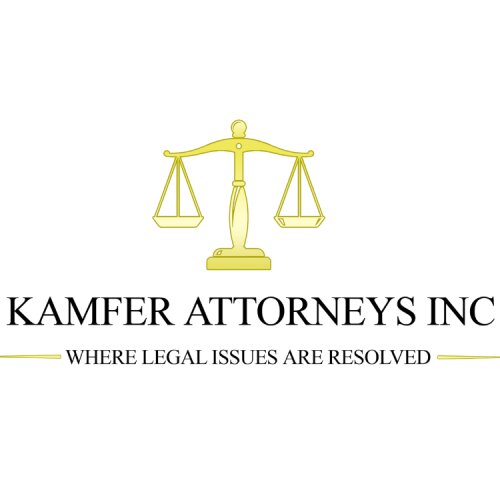Best Elder Abuse Law Lawyers in South Africa
Share your needs with us, get contacted by law firms.
Free. Takes 2 min.
Or refine your search by selecting a city:
List of the best lawyers in South Africa
About Elder Abuse Law in South Africa
Elder Abuse Law in South Africa seeks to protect older adults from various forms of harm, including physical, emotional, financial, and neglect. The law recognizes that elders are often more vulnerable and susceptible to abuse due to possible physical or cognitive impairments. In South Africa, elder abuse is addressed under broader legal frameworks such as domestic violence and human rights protection. The Older Persons Act 13 of 2006 is a significant legislative tool that offers legal recourse and protection for older persons. This Act aims to prevent abuse, support the well-being of older individuals, and promote care and social welfare services.
Why You May Need a Lawyer
Legal assistance in elder abuse cases can be crucial for several reasons. Lawyers can help victims or their families understand their rights and options under the law. Common situations that might require legal help include suspected financial exploitation by caregivers or family members, physical or emotional abuse by caretakers, cases of neglect by nursing home staff, and navigating protective orders or other legal measures to ensure an elder's safety. An attorney can also aid in involving law enforcement or government agencies if necessary.
Local Laws Overview
In South Africa, several key aspects of local laws are pertinent to elder abuse. The Older Persons Act 13 of 2006 aims to safeguard the dignity, health, and well-being of older persons. It also emphasizes community-based care and protection against abuse and neglect. The Domestic Violence Act is also applicable in cases where elder abuse occurs within family settings. Additionally, the South African Human Rights Commission and the Department of Social Development play crucial roles in elder protection by ensuring rights are respected and protected.
Frequently Asked Questions
What constitutes elder abuse in South Africa?
Elder abuse includes physical, emotional, financial abuse, and neglect. It often occurs in places such as the elder's home, nursing homes, or social settings.
What are the warning signs of elder abuse?
Warning signs can include unexplained injuries, sudden changes in financial situations, emotional withdrawal, poor hygiene, untreated medical conditions, and sudden behavioral changes.
What should I do if I suspect elder abuse?
If you suspect elder abuse, it's important to report it to local authorities, such as the police or social services, and seek legal advice promptly.
Can elder abuse cases be reported anonymously?
Yes, anonymous reporting is possible, particularly through specific helplines while maintaining confidentiality. It is important to provide as much detailed information as possible.
What is the role of the Department of Social Development regarding elder abuse?
The Department of Social Development provides services to protect and promote the welfare of older persons, including intervention in cases of abuse and neglect.
What legal protections are available under the Older Persons Act?
The Older Persons Act provides for the reporting of elder abuse, investigation of allegations, intervention measures, and protective services to ensure the safety and dignity of the elder.
Can an elder seek a protection order against their abuser?
Yes, under the Domestic Violence Act, an elder or their representative can seek a protection order against the abuser to prevent further harm.
Is financial exploitation considered a form of elder abuse?
Yes, financial exploitation is a common form of elder abuse and involves the illegal or improper use of an elder's funds, property, or resources.
How can family members prevent elder abuse?
Family members can prevent elder abuse by staying informed, maintaining regular contact with the elder, monitoring financial accounts, and being vigilant for signs of abuse.
Does elder abuse only occur in institutional settings?
No, while it can occur in institutions, elder abuse also commonly takes place in private homes, often perpetrated by family members or caregivers.
Additional Resources
For more assistance, individuals can contact the South African Human Rights Commission, the Department of Social Development, or local law enforcement agencies. Organizations such as Age-in-Action also provide support and advocacy for older persons in South Africa.
Next Steps
If you need legal assistance in elder abuse law, consider contacting a lawyer specializing in family or elder law to discuss your situation confidentially. Document all evidence of abuse, keep records of any interactions related to the abuse, and reach out to local authorities or community health services for immediate assistance. It's essential to act quickly to protect yourself or a loved one from further abuse.
Lawzana helps you find the best lawyers and law firms in South Africa through a curated and pre-screened list of qualified legal professionals. Our platform offers rankings and detailed profiles of attorneys and law firms, allowing you to compare based on practice areas, including Elder Abuse Law, experience, and client feedback.
Each profile includes a description of the firm's areas of practice, client reviews, team members and partners, year of establishment, spoken languages, office locations, contact information, social media presence, and any published articles or resources. Most firms on our platform speak English and are experienced in both local and international legal matters.
Get a quote from top-rated law firms in South Africa — quickly, securely, and without unnecessary hassle.
Disclaimer:
The information provided on this page is for general informational purposes only and does not constitute legal advice. While we strive to ensure the accuracy and relevance of the content, legal information may change over time, and interpretations of the law can vary. You should always consult with a qualified legal professional for advice specific to your situation.
We disclaim all liability for actions taken or not taken based on the content of this page. If you believe any information is incorrect or outdated, please contact us, and we will review and update it where appropriate.
Browse elder abuse law law firms by city in South Africa
Refine your search by selecting a city.
















